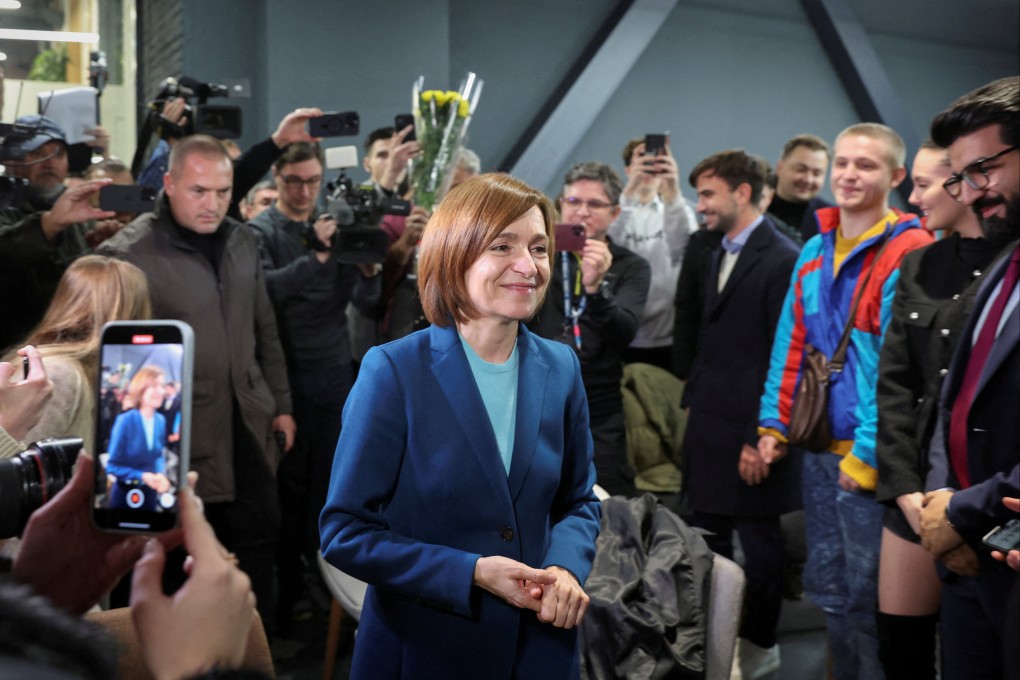
CHISINAU, Nov 4 (NNN-AGENCIES) — Moldova’s pro-Western President Maia Sandu has won a second term in a pivotal presidential runoff against a Russia-friendly opponent, in a race that was overshadowed by claims of Russian interference, voter fraud, and intimidation in the European Union candidate country.
With nearly 99% of votes counted in the second round of the presidential election held Sunday, Sandu had 54.7% of the vote, according to the Central Electoral Commission, or CEC, compared to 45.3% for Alexandr Stoianoglo, a former prosecutor general who was backed by the pro-Russia Party of Socialists.
The result will be a major relief for the pro-Western government, which strongly backed Sandu’s candidacy, and her push for closer Western ties on Moldova’s path toward the EU.
“Moldova, you are victorious! Today, dear Moldovans, you have given a lesson in democracy, worthy of being written in history books. Today, you have saved Moldova! In our choice for a dignified future, no one lost,” Sandu said after claiming victory after midnight.
But she went on to claim that her country’s vote had faced an “unprecedented attack” through alleged schemes including dirty money, vote-buying, and electoral interference “by hostile forces from outside the country” and criminal groups.
“You have shown that nothing can stand in the way of the people’s power when they choose to speak through their vote,” she added.
When polls closed locally at 9 PM, turnout stood at more than 1.68 million people – about 54% of eligible voters, according to the CEC. Moldova’s large diaspora, which cast ballots in record numbers of more than 325,000 voted, heavily in favor of Sandu in the runoff.
In the first round held Oct. 20, Sandu obtained 42% of the ballot but failed to win an outright majority over the second place Stoianoglo. The presidential role carries significant powers in areas such as foreign policy and national security and has a four-year term.
Moldova’s diaspora played a key role in the presidential vote and in a nationwide referendum held on Oct. 20, when a narrow majority of 50.35% voted to secure Moldova’s path toward EU membership. But the results of the ballots including Sunday’s vote have been overshadowed by allegations of a major vote-buying scheme and voter intimidation.
Instead of winning the overwhelming support that Sandu had hoped, the results in both races exposed Moldova’s judiciary as unable to adequately protect the democratic process.
On Sunday, Moldovan police said they had “reasonable evidence” of organized transportation of voters – illegal under the country’s electoral code – to polling stations from within the country and from overseas, and are “investigating and registering evidence in connection with air transport activities from Russia to Belarus, Azerbaijan and Turkey.”
“Such measures are taken to protect the integrity of the electoral process and to ensure that every citizen’s vote is cast freely without undue pressure or influence,” police said.
Moldova’s foreign ministry said on Sunday afternoon that polling stations in Frankfurt, Germany, and Liverpool and Northampton in the UK had been targeted by false bomb threats, which “intended only to stop the voting process.”
Stanislav Secrieru, the president’s national security adviser, wrote on X: “We are seeing massive interference by Russia in our electoral process,” which he warned had a “high potential to distort the outcome” of the vote.
Secrieru later added that the national voter record systems were being targeted by “ongoing coordinated cyberattacks” to disrupt links between domestic polling stations and those abroad, and that cybersecurity teams were “working to counter these threats and ensure system continuity.”
Moldova’s Prime Minister Dorin Recean said that people throughout the country had received “anonymous death threats via phone calls” in what he called “an extreme attack” to scare voters in the former Soviet republic, which has a population of about 2.5 million people.
After casting her ballot in Chisinau, Sandu said, “Today, more than ever, we must be united, keep our peace, keep our vote, keep our independence.”
“Thieves want to buy our vote, thieves want to buy our country, but the power of the people is infinitely greater,” she told reporters. been in power in Moldova since 2021, and a parliamentary election will be held in 2025. Moldova watchers warn that next year’s vote could be Moscow’s main target.
In the wake of Russia’s invasion of Ukraine in 2022, Moldova applied to join the EU. It was granted candidate status in June of that year, and in summer 2024, Brussels agreed to start membership negotiations. The sharp westward shift irked Moscow and significantly soured relations with Chisinau.
Since then, Moldovan authorities have repeatedly accused Russia of waging a vast “hybrid war,” from sprawling disinformation campaigns to protests by pro-Russia parties to vote-buying schemes that undermine countrywide elections. Russia has denied it is meddling. — NNN-AGENCIES



